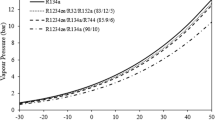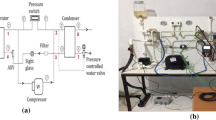Abstract
European Union regulations stipulate that household refrigeration systems must operate with fluid refrigerants that possess low global warming potential (GWPs). In this work, theoretical performance of six binary and one ternary mixture (which consists of R13I1, R290, R161, R32, R1234yf, and R1234ze(E)) was investigated. The performance parameters such as coefficient of performance (COP), refrigeration effect (RE), volumetric cooling capacity (VCC), discharge temperature, pressure ratio, and specific power consumption of all considered refrigerant mixtures is studied with respect to the evaporator temperature range of -18 to 180C and the condenser temperature range of 40 to 550C. The properties corresponding to different operating conditions for the refrigerants considered in this study are estimated using REFPROP 10. The findings demonstrated that, when compared to R134a, all the investigated refrigerants exhibited very low specific power consumption (apart from M9, M10, and M14-M16), and high volumetric cooling capacity (VCC) (apart from M11 and M13) under the operating conditions of evaporator temperature -180C and condenser temperature 400C. M1-M3 and M11-M13 gave similar and within 10% deviation in coefficient of performance, while M3 and M11-M13 refrigerant mixtures offer significantly low discharge temperatures when compared to R134a. Refrigerant mixtures M2 and M11 consistently exhibited a better performance in comparison to R134a in the aspect of majority of the performance parameters considered in this study. Finally, it is understood that M2 and M11 are two possible alternative refrigerants to conventional refrigerants used in small refrigeration units (R134a and R22). Further, it is also identified that these mixtures are non-flammable, possess zero ODP and low GWP values.














Similar content being viewed by others
Data availability
The datasets used and/or analysed during the current study are available from the corresponding author on reasonable request.
Abbreviations
- ANSI:
-
American National Standard Institute
- ASHRAE:
-
American Society of Heating, Refrigerating and Air-Conditioning Engineers
- CFC s:
-
Chlorofluorocarbon
- COP:
-
Coefficient of performance
- CSL:
-
Critical Suppression Line
- CSR:
-
Critical Suppression Ratio
- EU:
-
European Union
- GWP:
-
Global Warming Potential
- HCs:
-
Hydrocarbons
- HCFCs:
-
Hydrochlorofluorocarbons
- HFCs:
-
Hydrofluorocarbons
- HFOs:
-
Hydrofluoroolefins
- IPCC:
-
Intergovernmental Panel on Climate Change
- ODP:
-
Ozone Depletion Potential
- MIC:
-
Minimum Inert Concentration
- POE:
-
Polyol-ester
- RAC:
-
Refrigeration and Air Conditioning
- Tcond. :
-
Condensor Temperature
- Tevap. :
-
Evaporator Temperature
- TEWI:
-
Total equivalent warming impact
- UNEP:
-
United Nations Environment Programme
- VCC:
-
Volumetric cooling capacity
- VCRS:
-
Vapor compression refrigeration system
- X:
-
Mass concentration
- D:
-
Dilutant or Non-flammable
- mix:
-
Mixture
- R:
-
Refrigerant
References
Andrew Pon Abraham JD, Mohanraj M (2019) Thermodynamic performance of automobile air conditioners working with R430A as a drop-in substitute to R134a. J Ther Anal Calorim 136(5):2071–2086.https://doi.org/10.1007/s10973-018-7843-1
Aprea C, Greco A, Maiorino A (2017) Comparative performance analysis of HFO1234ze/HFC134a binary mixtures working as a drop-in of HFC134a in a domestic refrigerator. Int J Refrig 82:71–82. https://doi.org/10.1016/j.ijrefrig.2017.07.001
Bolaji BO (2020) Theoretical assessment of new low global warming potential refrigerant mixtures as eco-friendly alternatives in domestic refrigeration systems. Sci Afr 10:1–11. https://doi.org/10.1016/j.sciaf.2020.e00632
Chen Q, Yan JW, Chen G, Zhao Y, Shi Y, Zeng Z, Pan Q (2015) Experimental studies on the flammability of mixtures of dimethyl ether. J Fluorine Chem 176(1):40–43. https://doi.org/10.1016/j.jfluchem.2015.04.012
Dilshad S, Kalair AR, Khan N (2020) Review of carbon dioxide (CO2) based heating and cooling technologies: Past, present, and future outlook. Int J Energy Res 44(3):1408–1463. https://doi.org/10.1002/er.5024
Fatih Birol (2018) The Future of Cooling. International Energy Agency. https://www.iea.org/reports/the-future-of-cooling. Accessed October 2018
Feng B, Yang Z, Liu H (2020) Research on inhibition of flame retardants on flammability of R1234yf. Int J Refrig 118:302–310. https://doi.org/10.1016/j.ijrefrig.2020.06.031
Feng B, Yang Z, Zhai R (2018) Experimental study on the influence of the flame retardants on the flammability of R1234yf. Energy 143:212–218. https://doi.org/10.1016/j.energy.2017.10.078
Harish Kruthiventi SS, Venkatarathnam G (2016) Comparison of the straight adiabatic capillary tube expansion devices used in refrigeration systems operating with refrigerants R134a and R1234yf. J Ther Sci Eng Appl, 8(2). https://doi.org/10.1115/1.4032366
Heredia-Aricapa Y, Belman-Flores JM, Mota-Babiloni A, Serrano-Arellano J, García-Pabón JJ (2020) Overview of low GWP mixtures for the replacement of HFC refrigerants: R134a, R404A and R410A. Int J Refrig 111:113–123. https://doi.org/10.1016/j.ijrefrig.2019.11.012
Jabaraj DB, Narendran A, Lal DM, Renganarayanan S (2007) Evolving an optimal composition of HFC407C/HC290/HC600a mixture as an alternative to HCFC22 in window air conditioners. Int J Therm Sci 46(3):276–283. https://doi.org/10.1016/j.ijthermalsci.2006.05.004
Kumma N, Kruthiventi SSH (2022a) Flammability and performance studies of eco-friendly ternary refrigerant mixtures used in vapour compression systems. Environ Sci Pollut Res, 49908–49924. https://doi.org/10.1007/s11356-022-19363-z
Kumma N, Kruthiventi SSH (2022b) Thermodynamic Performance and Flammability Studies of Hydrocarbon Based Low Global Warming Potential Refrigerant Mixtures. J Ther Sci, 31. https://doi.org/10.1007/s11630-022-1642-5
Lemmon EW, Bell IH, Huber ML, McLinden MO (2018) NIST Standard reference database 23: reference fluid thermodynamic and transport properties-REFPROP, Version 10.0, National Institute of Standards and Technology. Standard Reference Data Program, Gaithersburg
Mohanraj M, Abraham AP (2020) Environment friendly refrigerant options for automobile air conditioners: a review. J Therm Anal Calorim 147(1):47–72. https://doi.org/10.1007/s10973-020-10286-w
Mohanraj M (2019) Experimental investigations on R430A as a drop-in substitute for R134a in domestic refrigerators. Proc Inst Mech Eng Part e: J Process Mech Eng 233(4):728–738. https://doi.org/10.1177/0954408918796369
Mohanraj M, Jayaraj S, Muraleedharan C, Chandrasekar P (2009) Experimental investigation of R290/R600a mixture as an alternative to R134a in a domestic refrigerator. Int J Therm Sci 48(5):1036–1042. https://doi.org/10.1016/j.ijthermalsci.2008.08.001
Mohanraj M, Muraleedharan C, Jayaraj S (2011) A review on recent developments in new refrigerant mixtures for vapour compression-based refrigeration, air-conditioning and heat pump units. In Intl J Energy Res (Vol. 35, Issue 8, pp. 647–669). https://doi.org/10.1002/er.1736
Mota-Babiloni A, Navarro-Esbrí J, Barragán Á, Molés F, Peris B (2014) Drop-in energy performance evaluation of R1234yf and R1234ze(E) in a vapor compression system as R134a replacements. Appl Therm Eng 71(1):259–265. https://doi.org/10.1016/j.applthermaleng.2014.06.056
Oruç V, Devecioğlu AG (2021) Experimental investigation on the low-GWP HFC/HFO blends R454A and R454C in a R404A refrigeration system. Int J Refrig 128(2021):242–251. https://doi.org/10.1016/j.ijrefrig.2021.04.007
Padmavathy SR, Chockalingam MP, Kamaraj N, Glivin G, Thangaraj V, Moorthy B (2021) Performance studies of low GWP refrigerants as environmental alternatives for R134a in low-temperature applications. Environ Sci Pollut Res. https://doi.org/10.1007/s11356-021-15875-2
Rasti M, Aghamiri S, Hatamipour MS (2013) Energy efficiency enhancement of a domestic refrigerator using R436A and R600a as alternative refrigerants to R134a. Int J Therm Sci 74:86–94. https://doi.org/10.1016/j.ijthermalsci.2013.07.009
Shaik SV, Babu TPA (2017a) Theoretical Computation of Performance of Sustainable Energy Efficient R22 Alternatives for Residential Air Conditioners. Energy Procedia 138:710–716. https://doi.org/10.1016/j.egypro.2017.10.205
Shaik SV, Babu TPA (2017b) Theoretical Performance Investigation of Vapour Compression Refrigeration System Using HFC and HC Refrigerant Mixtures as Alternatives to Replace R22. Energy Procedia, 109(November 2016), 235–242. https://doi.org/10.1016/j.egypro.2017.03.053
Shaik SV, Babu TPA (2018) Thermodynamic performance analysis and flammability study of various new ozone friendly non azeotropic refrigerant mixtures as alternatives to replace R22 used in residential air conditioners. Intl J Heat Technol, 36(4), 1470–1481. https://doi.org/10.18280/ijht.360441
Sruthi Emani M, Kumar Mandal B (2018) The Use of Natural Refrigerants in Refrigeration and Air Conditioning Systems: A Review. IOP Conference Series: Materials Science and Engineering, 377(1). https://doi.org/10.1088/1757-899X/377/1/012064
Tian G, Li X, Gao Y, Zhang F (2016) Theoretical and Experimental Study of Explosion Limits and the Inhibition of Flammable Refrigerants. J Softw Eng Appl 09(10):501–515. https://doi.org/10.4236/jsea.2016.910033
Wu J, Chu Y, Hu J, Liu Z (2009) Performance of mixture refrigerant R152a/R125/R32 in domestic air-conditioner. Int J Refrig 32(5):1049–1057. https://doi.org/10.1016/j.ijrefrig.2008.10.009
Wu X, Dang C, Xu S, Hihara E (2019) State of the art on the flammability of hydrofluoroolefin (HFO) refrigerants. Int J Refrig 108:209–223. https://doi.org/10.1016/j.ijrefrig.2019.08.025
Wu X, Zhang X, Tang F, Xu S, Dang C, Sun D (2022) Flammability inhibition effects of R227ea, R125, R134a, and R744 on 3,3,3-trifluoropropene (R1243zf). Int J Refrig 134:55–63. https://doi.org/10.1016/j.ijrefrig.2021.11.019
Yang M, Zhang H, Meng Z, Qin Y (2019) Experimental study on R1234yf/R134a mixture (R513A) as R134a replacement in a domestic refrigerator. Appl Therm Eng, 146(September 2018), 540–547. https://doi.org/10.1016/j.applthermaleng.2018.09.122
Yang Z, Wu X, Wang X, Tian T (2015) Research on the flammable characteristics of fluoroethane (R161) and its binary blends. Int J Refrig 56:235–245. https://doi.org/10.1016/j.ijrefrig.2015.03.020
Yataganbaba A, Kilicarslan A, Kurtbaş I (2015) Exergy analysis of R1234yf and R1234ze as R134a replacements in a two evaporator vapour compression refrigeration system. Int J Refrig 60:26–37. https://doi.org/10.1016/j.ijrefrig.2015.08.010
Zhao Y, Bin L, Haibo Z (2004) Experimental study of the inert effect of R134a and R227ea on explosion limits of the flammable refrigerants. Exp Thermal Fluid Sci 28(6):557–563. https://doi.org/10.1016/j.expthermflusci.2003.06.005
Zhong Q, Huang Y, Zhao H, Wang X, Zhang Y, Shen J (2022) Experimental study on the influence of trifluoroiodomethane on the flammability of difluoromethane and propane. Int J Refrig 135:14–19. https://doi.org/10.1016/j.ijrefrig.2021.12.002
Funding
The authors did not receive Fund from any organization for the submitted work.
Author information
Authors and Affiliations
Contributions
Nagarjua Kumma handled methodology and writing. Gokul Sai Seethala, Yatna Bhagat and Sai sarath were responsible for data collection. Dr Satya Sai Harish Kruthiventi was responsible for conceptualization, reviewing and final editing of the manuscript. The final manuscript was read and approved by all of the authors.
Corresponding author
Ethics declarations
Ethics approval and consent to participate
Not applicable.
Consent for publication
Not applicable.
Competing interests
The authors declare no competing interests.
Additional information
Responsible Editor: Philippe Garrigues
Publisher's note
Springer Nature remains neutral with regard to jurisdictional claims in published maps and institutional affiliations.
Rights and permissions
Springer Nature or its licensor (e.g. a society or other partner) holds exclusive rights to this article under a publishing agreement with the author(s) or other rightsholder(s); author self-archiving of the accepted manuscript version of this article is solely governed by the terms of such publishing agreement and applicable law.
About this article
Cite this article
Kumma, N., Seethala, G.S., Bhagat, Y. et al. Theoretical performance studies on environment friendly refrigerants used in refrigeration units. Environ Sci Pollut Res 30, 63065–63083 (2023). https://doi.org/10.1007/s11356-023-26409-3
Received:
Accepted:
Published:
Issue Date:
DOI: https://doi.org/10.1007/s11356-023-26409-3




